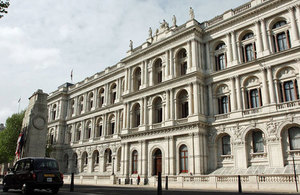UKEF appoints Carl Williamson as Head of Trade Finance
Carl joins UKEF from Lloyds Banking Group, where he spent 31 years in a variety of roles. Most recently he was a Relationship Director, managing and developing a portfolio of customers within the Manufacturing & Industrials sector. Prior to this he was Head of Cash Management and Trade Finance, delivering cash and trade products to large London corporates.
In this new role, Carl will head the Trade Finance Business as UKEF grows its support for exporters with a range of products including Working Capital, Bond Support and Export Insurance. He will be responsible for leading a business unit incorporating UKEF’s 25 strong team of Export Finance Managers (EFMs), the Business Group Operations area and team of Short-Term Business Underwriters, as they drive the uptake and adoption of the export credit agency’s products across the UK.
Gordon Welsh, Head of UKEF’s Business Group, welcomed Carl to UKEF, saying:
I am very pleased to welcome Carl to UK Export Finance and look forward to working with him as we expand the reach of our unique financial offer. UKEF is at the heart of the government’s support for exports, and the work of our EFMs and Short-Term Business teams is crucial as we ensure every UK company meets its export potential.
Carl Williamson, Head of Trade Finance at UKEF, added:
The right financial support can play a vital role in ensuring that a company is able to compete overseas and grow. For the last 100 years, UKEF has been of the heart of the government’s support for UK exporters and I am delighted to be joining the department, and to be responsible for growing this important range of products and services.
UK Export Finance is the UK’s export credit agency and a government department, working alongside the Department for International Trade as an integral part of its strategy and operations.
It exists to ensure that no viable UK export lacks for finance or insurance from the private market. It provides finance and insurance to help exporters win, fulfil and ensure they get paid for export contracts.
Sectors in which UKEF has supported exports include: infrastructure, aerospace, healthcare, telecommunications, transport and industrial development.
UKEF has a regional network of 24 export finance managers, who support UK businesses export their goods and services.
UKEF support exporters with a range of products that include:
- Bond insurance policy
- Bond support scheme
- Buyer & supplier credit financing facility
- Direct lending facility
- Export insurance policy
- Export refinancing facility
- Export working capital scheme
- Letter of credit guarantee scheme
The latest information on UKEF’s country cover positions can be found here.
If you’re a business owner and want to learn more about how UKEF could help you, tell us about your business.
